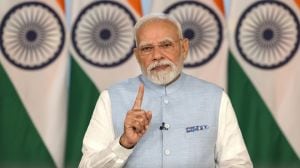Bush wants to talk N-ties with Manmohan
Amidst growing concerns about global warming and rising prices of oil, President George W Bush has underlined the importance of nuclear ener...

Amidst growing concerns about global warming and rising prices of oil, President George W Bush has underlined the importance of nuclear energy as an alternative to fossil fuels and sharing it with developing countries, especially India.
In an interview published in the London Times today, Bush said, “I’m a big believer that nuclear power, the newest generation of nuclear power, ought to be a source of energy, and we ought to be sharing these technologies with developing countries. I’m going to talk to the Prime Minister of India about that when he comes to see me.”
Although nuclear cooperation has been widely assumed to be at the top of the agenda when Manmohan Singh meets Bush at the White House on July 18, this is the first time that the President himself has pointed to it in a positive manner.
Bush’s enthusiasm for nuclear cooperation with India stands in stark contrast to the bureaucratic negativism in Washington on the prospects for civilian nuclear energy cooperation with India.
While keeping its fingers crossed on whether President Bush will be able to lift the three decades old nuclear blockade against India next month, Delhi is also looking at the possibility of joining the International Thermonuclear Energy Project.
The United States, a founding member of the ITER, pulled out in 1998 and re-joined in 2003. Canada withdrew in 2003. The other members are Russia, China, Japan and the European Union.
The 500-megawatt reactor could cost about US$6.14 billion and take 10 years to complete. The reactor is expected to be operational for 20 years. The European Union intends to cover 40 percent of the cost and France will contribute an additional 10 percent.
At the last summit btween India and the European Union in The Hague in November 2004, Brussels supported India’s participation in the ITER project.
The Indian scientific establishment, which has its own modest programme on fusion, wants to join forces with the ITER. When he joins the summit of the G-8 industrial democracies at Gleneagles, Scotland early next month, Manmohan Singh might be looking for support for India’s effort to join the ITER.
The G-8 leaders are likely to endorse nuclear energy for the first time in decades at Gleneagles as they discuss the global threat of climate change.
Photos





- 01
- 02
- 03
- 04
- 05

























